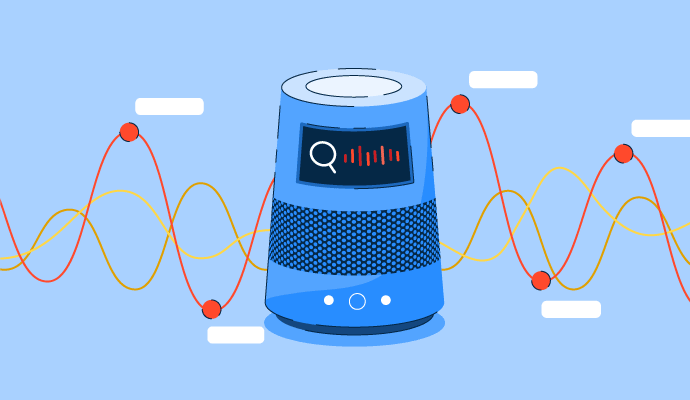
Voice search has changed how we interact with our devices and access information. Nowadays, we frequently use them to look things up online. It’s easier and requires less effort since users speak commands instead of typing them.
Voice recognition technology and software power these searches and convert our spoken words into text. Artificial intelligence (AI) interprets the text and uses natural language processing (NLP) and machine learning (ML) to produce expected results.
These searches are getting even more familiar with Siri or Google Assistant. For businesses, it opens up an opportunity to optimize for voice searches. Let’s look at current usage patterns to explore these kinds of opportunities.
Voice search usage
Voice search is catching up with the younger crowds. People between 25 and 49 interact with smart devices and speakers daily. The statistics below discuss growing usage and trends.
- Weekly voice searches are a habit for 21% of people.
- Google has broken language barriers, offering mobile voice search in over 60 languages.
- Voice search answers are short, around 29 words.
- People are asking questions in nearly 10% of voice searches.
- Voice makes up 20% of mobile queries.
- Over 20% of the searches done using Google apps are said to be done by speaking to the device instead of typing.
- By the end of 2023, sales from voice searches could reach $40 billion.
- Expect to see 8.4 billion voice assistant devices around the world by 2024.
- Voice search is big, with over 4 billion digital assistants globally.
- Voice shopping is on track to reach $80 billion a year by 2023.
- 40% of adults talk to their devices to search every day.
- 50% of smart speaker owners love using voice commands to keep their hands free.
- The voice recognition market could hit $26.8 billion by 2025.
- 71% of internet users preferred to raise a query through voice search instead of typing in 2023.
- 50% of U.S. consumers said they use voice search daily in 2022.
- The global voice recognition tech market will amount to almost 50 billion U.S. dollars in 2029.
Voice search in daily life and home use statistics
Voice search is becoming a big deal. It’s like having a helper who does things for you by listening to your voice. You can ask your phone where the closest coffee shop is, and it tells you where to go without you having to type a thing.
The statistics below show how voice searches help users in their everyday lives.
- Smart speaker users ask for around 11 different things weekly.
- Talking to a voice-activated speaker feels natural for over half of users.
- A quarter of people who own smart speakers have shopped using voice commands.
- In 2021, nearly 90 million Americans owned a smart speaker.
- 34% of people without smart speakers are thinking about buying one soon.
- The number of households that use smart speakers is estimated to reach 93 million households by 2027.
- 75% of homes are expected to own smart speaker devices by 2025.
Voice search and local business statistics
Most consumers find voice search handy when they’re busy with something else. More than half of people prefer making restaurant reservations using voice search. Several kinds of local searches on mobile phones take place on voice search. The statistics below justify local companies increasing their adoption of voice search
- 76% of voice searches are for things nearby or local. This figure is expected to triple in 2024.
- Voice searches on mobile are three times more likely to be for local information than text searches.
- On Windows 10 desktops, 25% of searches are done using Cortana’s voice feature.
- 50% of consumers like using voice search to discover local businesses.
- 82% of smartphone users turn to search engines to find local shops, and 58% of users discover local businesses through voice search.
- After a local search on their phone, 88% of people will visit or call a related store within a day.
- Local voice searches on smartphones lead to a purchase within a day by 18%.
- 27% of people check out a local business website after a voice search.
- 1 in 4 people are open to trying voice search to find local shops.
- Over half of consumers have looked up local business info with their voice in the past year.
- 62% of people use voice to find local businesses while driving.
- Local content grabs 22% of voice search queries.
- One-third of clicks from Google searches go to the “snack pack” of local business listings.
- Location-based voice searches are key for businesses in multiple places – they get 22% of voice queries.
- Reviews are super important, as they help result in voice searches if it’s about a local business. They can encourage people to spend up to 31% more.
- 52% of people use voice to research products or services.
- Voice search and good online reviews go hand in hand for local businesses – 27% of users go straight to the website after a voice search.
- 76% of smart speaker users asking about local places do so every week.
- 56% of users reported using voice search on their smartphones to gather information about a brand or business.
- 27% of the global online population is using voice search on smartphones.
- 28% of the people looked up businesses using voice search on their desktop or laptop computers.
- 35% of the voice search users searched for food delivery using voice search in 2023.
Voice search statistics for different industries
From shopping to healthcare, voice search is changing how we find information. Most industries are hopping on the voice search train! The statistics below describe how voice search plays a role in different industries.
Voice search statistics for healthcare
- 68% of doctors and nurses think voice search will be important for patient engagement.
- 42% of healthcare providers are using or will use voice assistant tech to help and connect with patients.
- 21% of people who use voice assistants have asked about symptoms and medical providers
Voice search statistics for retail
- 24% of shoppers have used voice assistants to shop online.
- 40% of people who use voice assistants have looked up details about products with them.
- 71% of shoppers would rather use voice search to check the prices of items.
Voice search statistics for the automotive industry
- 41% of people who use voice assistants have requested help finding a nearby dealership or service center.
- 44% of buyers have used voice search to determine how much cars cost.
- The number of voice searches for “car dealerships near me” has increased by 200% since 2022.
Voice search statistics for the finance industry
- 57% of people who use voice assistants have checked bank balances.
- 28% of people who use voice search have asked for details about banking or financial services.
- 69% of people feel okay about using voice recognition to do banking transactions.
Voice search statistics for the travel industry
- 46% of people who travel have used voice search to find or book places to stay.
- 61% of hotel guests have used voice-controlled gadgets to change room settings like temperature or lights.
- 72% of travelers would rather use voice-activated helpers to ask for hotel stuff like food delivery or cleaning.
Voice search optimization and web presence statistics
Google Home reveals that voice search pages load in under 5 seconds. Businesses are now structuring their content to make it easier to find on voice searches.
Many Facebook shares and X (formerly Twitter) posts have become a part of voice search results. Let’s look at what businesses are doing to compete.
- Websites with structured data markup appear in over 34% of voice search results. Several niche businesses are adding schema markup to their pages.
- 50% of the answers from voice search come from a featured snippet box – like this one!
- The top voice search results are usually also the top 3 results on desktop searches.
- Dentists’ offices have done the best job optimizing for voice search, while consumer protection groups are the least optimized.
- Google’s voice recognition is right 95% of the time, making it easy for users to trust.
- Keywords like “best,” “easy,” “free,” “top,” “list,” etc.) are predicted to increase by 20% in 2024
- 34% of people who don’t own a voice assistant are interested in buying it.
- Apple’s Siri and Google Assistant are the most popular digital assistants. Each holds around 36% of the market share, while Alexa lags behind at 25%.
- Voice search assistants are getting smarter with an average accuracy rate of 93% for answering search queries.
- Voice search results are loaded 52% faster compared to average search results.
Listen to the sound of my voice
Spoken language is more conversational and natural than formulaic text-based queries. As a result, search queries on voice have become longer and more question-based. For instance, instead of typing “weather New York,” a user might ask, “What will the weather be like in New York today?”
Businesses need to optimize their content for queries like these, so they’re sure to come up in voice search results.
Learn more about search engine optimization to enhance the overall visibility of your business on Google Search.
Sagar Joshi is a former content marketing specialist at G2 in India. He is an engineer with a keen interest in data analytics and cybersecurity. He writes about topics related to them. You can find him reading books, learning a new language, or playing pool in his free time.





